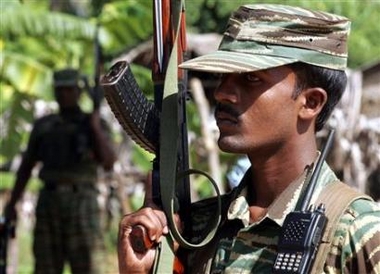|
Breakthrough in Sri Lanka peace bid, Geneva talks on
(AFP)
Updated: 2006-02-07 08:33
Sri Lanka's warring parties agreed to meet for talks in Geneva on February
22, ending a three-year deadlock in negotiations on how to end decades of ethnic
bloodshed, peace broker Norway said.
The breakthrough came after Norway's top envoy Erik Solheim met the Tamil
Tiger rebel chief negotiator Anton Balasingham in London.
"The parties to the conflict in Sri Lanka, the government of Sri Lanka and
the Liberation Tigers of Tamil Eelam, have asked Norway to facilitate talks in
Geneva from February 22 to 23," the Norwegian embassy said in a statement.
The two-day talks are initially aimed at strengthening a ceasefire that went
into effect on February 23, 2002 but has not been fully implemented by either
the military or the Tamil Tigers.
"The parties will discuss how they can improve the implementation of the
ceasefire agreement," the embassy said. "This is the first time in three years
that the parties meet face-to-face at such a high level."
Solheim said he will lead Norway's own team at the talks. The four-member
Tiger delegation will be led by Balasingham and Sri Lanka's team will be headed
by Health Minister Nimal Siripala de Silva.

Tamil Tiger rebels hold their weapons as they
keep guard outside a political office at Sampur village in Trincomalee,
eastern Sri Lanka, January 20,
2006.[Reuters/file] | "The parties are taking a
small, but very significant step towards putting the peace process back on a
positive track," Solheim said. "We expect the negotiations to be tough."
He said Norway's former deputy foreign minister Vidar Helgesen, who played a
key role in the peace process in earlier rounds of talks, will also be involved
in the Geneva negotiations.
"The parties have chosen Geneva for their meeting because of the very
supportive role Switzerland has always played," the statement said, adding that
the two sides were expected to focus on strengthening the ceasefire.
Earlier the two sides were squabbling over a venue, with the Tigers insisting
on the Norwegian capital while Colombo wanted an Asian venue. Later both
compromised and agreed to travel to Geneva for the talks but no date had been
set till Monday.
The truce came under renewed pressure following an escalation of violence
since December in which at least 153 people were killed.
However, the level of violence fell after Solheim on January 25 clinched a
deal between Colombo and the Tigers to end the deadlock in their talks and have
a face-to-face meeting in Geneva.
The two sides had their last face-to-face meeting in Japan in March 2003 but
the Tigers pulled out of what would have been the seventh round of negotiations
scheduled in Thailand in April 2003.
Four previous peace attempts have ended in failure and led to more bloodshed
in a country where more than 60,000 people have been killed since 1972.
Sri Lanka's key financial backers said Monday that the agreement to revive
talks will help reconstruction but there would be no significant foreign
investment until lasting peace was achieved.
"We haven't got a security and a peace framework in which people have full
confidence at this time," the World Bank's country director for Sri Lanka, Peter
Harrold, told reporters before the talk dates were announced.
He said the country had maintained an average growth rate of five percent
even during the height of fighting, but real peace was essential to attract
serious investments.
|